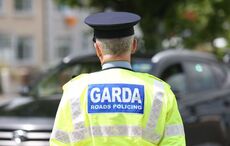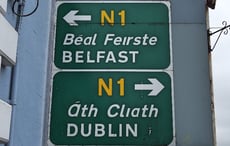THE peace process is stronger now than at any time since the signing of the Good Friday Agreement, Sinn Fein's Martin McGuinness has claimed.It is a decade on since U.S. senator George Mitchell uttered the words that the world had waited to hear after 38 years of the Troubles."I am pleased to announce that the two governments and the political parties in Northern Ireland have reached agreement," he told waiting journalists at Castle Buildings at 5:36 p.m. on Good Friday 1998.While many of those who brokered the agreement, including the SDLP's John Hume and the Ulster Unionist Party's David Trimble, have since retired, the peace process has managed to survive various serious political obstacles in the last 10 years.Those crises included the Real IRA bomb attack on Omagh in August 1998 which killed 29 people and two unborn children.In the years that followed the signing of the agreement Unionists collapsed the power-sharing Executive at Stormont on two occasions over demands for IRA decommissioning and later allegations of Republican involvement in a spy-ring.But 10 years on Sinn Fein and the Democratic Unionist Party (DUP) are now in government, with Ian Paisley and McGuinness touring the world to promote Northern Ireland to foreign investors.However, a key issue remaining to be resolved is the transfer of policing and justice powers from the British government to the Stormont assembly.Unionists insist that the time is not yet right for the transfer of those powers, claiming that more needs to be done to improve confidence within the Protestant community.Republicans insist that the transfer of powers was agreed by all parties during talks at St. Andrews in October 2006 and that the DUP cannot now attempt to renegotiate it.As the policing dispute continues, Unionists have now demanded that the IRA's ruling Army Council must stand down before they will agree to the transfer of justice powers.However, those Unionist demands appear to have fallen on deaf ears in both British government and IRA quarters.In its traditional Easter message, the IRA leadership reaffirmed its support for the peace process, but pointedly gave no indication that it is preparing to stand down any time soon.In a statement read out at Republican commemorations across Ireland, the IRA said, "Our task and that of all Irish Republicans is to shape the future through our commitment to achieving our goal of a united Ireland."Since 28 July 2005, IRA volunteers are playing a positive role in the new phase of our struggle. You have entered into this with energy and vigor."We commend this work and appeal to everyone to continue until we achieve our objectives."Insisting that the principles enshrined in the 1916 Proclamation remained as relevant as ever, the IRA said, "We have proven that together, in unity and with comradeship, we can advance our struggle. Let us rededicate ourselves to that goal."Despite Unionist opposition, Northern Secretary of State Shaun Woodward appeared to signal that the transfer of policing and justice powers would still go ahead later this year.Woodward said the political progress made over the last 10 years meant there was now "no question" that Northern Ireland would ever go back to the Troubles.He highlighted the Independent Monitoring Commission's (IMC) assertion that IRA is now solely involved in peaceful activities, and that the principles enshrined in the Good Friday Agreement would guarantee Northern Ireland "stability, peace and prosperity" for future generations.Praising the establishment of the power-sharing Executive as "one of the most successful governments anywhere," he said, "I take nothing for granted in politics, but the fact of the matter is what we have seen, over the last year particularly, in Northern Ireland are these institutions, the Assembly and the Executive, working together in a way that even those who dreamed it might be possible couldn't have anticipated."I think there is no question that Northern Ireland will ever go back to the ways of the past."It is committed now to this new stable, prosperous future." Insisting that republicans had played their part in bringing peace toNorthern Ireland, McGuinness said, "Politics in the North had for years been a scene of failed political initiative after failed political initiative by the British government as they sought to undermine support for Sinn Fein and bolster the so-called center ground of the SDLP and UUP."Last year Sinn Fein achieved what many considered impossible - a comprehensive agreement with Ian Paisley and the DUP."There could never have been a successful accommodation without the involvement of Irish Republicans."




Comments